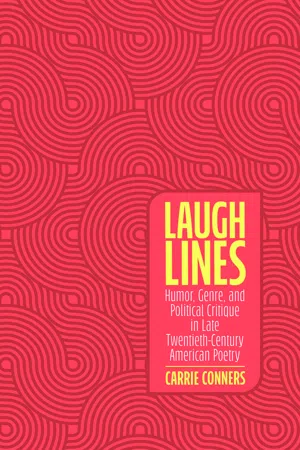
Laugh Lines
Humor, Genre, and Political Critique in Late Twentieth-Century American Poetry
- 174 pages
- English
- PDF
- Available on iOS & Android
Laugh Lines
Humor, Genre, and Political Critique in Late Twentieth-Century American Poetry
About this book
Humor in recent American poetry has been largely dismissed or ignored by scholars, due in part to a staid reverence for the lyric. Laugh Lines: Humor, Genre, and Political Critique in Late Twentieth-Century American Poetry argues that humor is not a superficial feature of a small subset, but instead an integral feature in a great deal of American poetry written since the 1950s. Rather than viewing poetry as a lofty, serious genre, Carrie Conners asks readers to consider poetry alongside another art form that has burgeoned in America since the 1950s: stand-up comedy. Both art forms use wit and laughter to rethink the world and the words used to describe it. Humor's disruptive nature makes it especially whetted for critique. Many comedians and humorous poets prove to be astute cultural critics. To that end, Laugh Lines focuses on poetry that wields humor to espouse sociopolitical critique. To show the range of recent American poetry that uses humor to articulate sociopolitical critique, Conners highlights the work of poets working in four distinct poetic genres: traditional, received forms, such as the sonnet; the epic; procedural poetry; and prose poetry. Marilyn Hacker, Harryette Mullen, Ed Dorn, and Russell Edson provide the main focus of the chapters, but each chapter compares those poets to others writing humorous political verse in the same genre, including Terrance Hayes and Anne Carson. This comparison highlights the pervasiveness of this trend in recent American poetry and reveals the particular ways the poets use conventions of genre to generate and even amplify their humor. Conners argues that the interplay between humor and genre creates special opportunities for political critique, as poetic forms and styles can invoke the very social constructs that the poets deride.
Frequently asked questions
- Essential is ideal for learners and professionals who enjoy exploring a wide range of subjects. Access the Essential Library with 800,000+ trusted titles and best-sellers across business, personal growth, and the humanities. Includes unlimited reading time and Standard Read Aloud voice.
- Complete: Perfect for advanced learners and researchers needing full, unrestricted access. Unlock 1.4M+ books across hundreds of subjects, including academic and specialized titles. The Complete Plan also includes advanced features like Premium Read Aloud and Research Assistant.
Please note we cannot support devices running on iOS 13 and Android 7 or earlier. Learn more about using the app.
Information
Table of contents
- Cover
- Laugh Lines
- Title
- Copyright
- Dedication
- Contents
- Acknowledgments
- Introduction
- CHAPTER ONE | The Good Life The Politics of Hedonism in Marilyn Hacker’s Love, Death, and the Changing of the Seasons
- CHAPTER TWO | Bursting at the Seams Exploding the Confines of Reification with Creative Constraints in Harryette Mullen’s Sleeping with the Dictionary
- CHAPTER THREE | “But He Aint Never Been Seen!” The Protean Howard Hughes and Overlapping Capitalist Narratives in Ed Dorn’s Gunslinger
- CHAPTER FOUR | Russell Edson’s Bestiary Humanists in a Posthuman World
- CODA | Connections and Conclusions
- Notes
- Works Cited
- About the Author